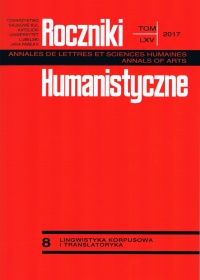Predicates as Expressions of the Concept Relation: Analysis of Polish and French Legal Terms ‘Marriage’
Abstract
The method of analysis proposed in the article is based on realistic metaphysics. The ontological structure (conceptual representation of reality) is developed on the basis of specialists’ knowledge and related to the meaning of the term. The tool for expressing conceptual components in a language are predicates that receive the status of a term in the specialized text. On the example of Polish and French terms of the same concept ‘marriage’ in the Code of Canon Law (1983), the author shows that noun and verbal predicates express different aspects of the concept (profiles), are related to cause and effect relations and form a coherent whole. The analysis of parallel bilingual texts shows that Polish and French terms have different predicates (ways of naming conceptual components). Differences also appear at the level of the text, which corresponds to stylistic standards. This combination of conceptual analysis levels with the lexical and syntactic layers of the discourse also gives tips for more precise elaboration of linguistic facts in computer linguistics.
References
Bartmiński Jerzy & Stanisława Niebrzegowska, 1998, « Profilowanie a podmiotowa interpretacja świata » [in :] Profilowanie w języku i w tekście, éds. J. Bartmiński, R. Tokarski, Lublin, Wydawnictwo UMCS, 211–225.
Bogacki Krzysztof, 2017, « Les équivalents lexicaux du prédicat sémantique de volonté », dans le même volume, 45-56.
Bourigault Ddidier & Monique Slodzian, 1999, « Pour une terminologie textuelle » [in :] Terminologies nouvelles 19, 29-32.
Depecker Loïc, 2003, « Saussure et le concept » [in :] Bulletin de la Société de linguistique de Paris, 98 53-100.
Dury Marianne & Michel Raphaël, 2016, « Enjeux argumentatifs de la définition : l’exemple des débats sur l’ouverture du mariage aux couples de même sexe » [in :] Langages, 204, 121-138.
Gilson Etienne, 1969, Linguistique et philosophie. Essais sur les constantes philosophiques du langage, Paris, Vrin.
Grzegorczykowa Renata, 1992, « Kognitywne ujęcie znaczenia a problem realizmu filozoficznego” [in :] Język a kultura, 8, 36-41.
Grzegorczykowa Renata, 2004, « Punkt widzenia nadawcy w znaczeniach leksemów » [in :] Punkt widzenia w języku i w kulturze, éds. Bartmiński J. et al., Lublin, Wydawnictwo UMCS, 161-176.
Harris Zelling. S., 1976, « La genèse de l'analyse des transformations et de la métalangue » [in :] Langages 99, 9-20.
Kleiber Georges, 1994, Nominales. Essais de sémantique référentielle, Paris, Armand Colin.
Kleiber Georges, 1999, Problèmes de sémantiques. La polysémie en questions, Lille, Presses Universitaires de Septentrion.
Langacker Ronald W., 1987, Fundation of Cognitive Grammar, Vol. I: Theoretical Prerequisites, Stanford, Stanford University Press.
Lapaire Jean-Rémi, 2017, « Verbes et constructions verbales en grammaire cognitive : la prédication autrement » [in :] Corela [En ligne], HS-22 | 2017, mis en ligne le 31 août 2017, consulté le 11 octobre 2017. URL : http://corela.revues.org/4992 ; DOI : 10.4000/ corela.4992.
Martin Robert, 1990, « La définition ‘naturelle’ » [in :] La définition, éd. J. Chaurand & F. Mazière, Paris, 86-95.
Martin Robert, 2001, Sémantique et automate, Paris, PUF.
Maryniarczyk Andrzej, 2015, « Analogiczna teoria znaczenia terminów językowych. Elementy metafizyki języka » [in :] Roczniki Humanistyczne, LXIII, z. 8, 21-36.
Mazurkiewicz Paulina, 2009, « Autour du concept et du terme de mariage/małżeństwo : énoncés définitoires français et polonais dans le discours théologique » [in :] Roczniki Humanistyczne, LVII, z. 5, 163-174
Mazurkiewicz Paulina, 2010, « La terminologie française et polonaise du mariage : entre le présupposé existentiel et les moyens linguistiques d’expression du concept » [in :] Des mots et du texte aux conceptions de la description linguistique, éds. A. Dutka-Mańkowska, T. Giermak-Zielińska, Warszawa, Wyd. UW, 342-350.
Mazurkiewicz Paulina, 2012, Terminologie française et polonaise relative à la famille, Thèse de doctorat, Lublin, KUL.
Mazurkiewicz Paulina, 2015a, Terminologie française et polonaise relative à la famille, Peter Lang Edition.
Mazurkiewicz Paulina, 2015b, « La relation concept-terme sur l’exemple de la terminologie du mariage dans le Code de droit canonique » [in :] Rassegna Italiana di Linguistica Applicata, XLVI, 3, 147-156.
Riegel Martin, 1990, « La définition, acte du langage ordinaire – De la forme aux interprétations » [in :] La définition, éds. J. Chaurand & F. Mazière, Paris, Larousse, 97-110.
Slodzian Monique, 2000, « L’émergence d’une terminologie textuelle et le retour du sens » [in :] Le Sens en terminologie [éds.] Henri Bejoint et Philippe Thoiron, Lyon, PUL, 61-85.
Śliwa Dorota, 2011, « Les inférences à fondement lexical – pour une dimension ontologique de la sémantique lexicale » [in :] Recherches Linguistiques, 32, 229-238.
Śliwa Dorota, 2013, « Testament : entité – concept – terme français et polonais dans leurs relations pluridimensionnelles » [in :] Roczniki Humanistyczne, LXI, z. 8, 131-147.
Śliwa Dorota, 2015, « Parlons cerises : les prédicats et les relations dans les définitions lexicographiques et dans les énoncés définitoires » [in :] Białostockie Archiwum Językowe, 15, 413-428.
Thoiron Philippe & Henri Béjoint, 2010, « La terminologie, une question de termes ? » [in :] Meta, 55 (1), 105–118. DOI: 10.7202/039605ar.
Vetulani Grażyna, 2012, Kolokacje werbo-nominalne jako samodzielne jednostki języka, Poznań, Wydawnictwo Naukowe UAM.
Copyright (c) 2017 Roczniki Humanistyczne

This work is licensed under a Creative Commons Attribution-NonCommercial-NoDerivatives 4.0 International License.





